It is strange how the language of ‘common life will find its way into the recesses of Science the most abstruse. Custom, it is true, is the law of language, and every idiom is permissible, if not strictly proper, “Si volet usus,” as declared by the Augustan Poet.
All which is permissible, and even proper, however, is not always agreeable to the laws of a pure taste; and it would seem that certain walks of Science, if not of Literature, itself a science, should be left in the undisturbed possession of their own vocabulary.
But custom, as a law of language, is almost paramount, and the learned as well as the unlearned, the doctors of science as well as the un-lettered labourers, the Masters in Israel equally with the bearers of burdens, all fall under its acknowledged sway, and speak even in their own fields, ” lit volet usus.
Those reflections naturally arise out of a consideration of the subject indicated in the title of this article. The proclivity of man to evil is so much greater than his aptness for virtue, the progression downward is so rapid, the “facilis descensus” so plain and marked, while the effort to do good is so painful and slow, so great the ” opus” and ” labour,” that the common mind, impressed with a firm conviction of its truth, will not believe but that all progression must needs be an advancement for evil.
Thus, the phrases ” Advancive age,” “fast youth,” and the like, are always used in this last and worse sense, and the thought of our people, so far ab least as it is to be found in their language, one of the outward signs of that thought, would seem to ignore all advancement for good.
It is to this cause we would impute the jealous honour entertained by some brethren, at the use of the word ” Advancive in Freemasonry.”
We think that this feeling arises from a misapprehension of the meaning of the word, and, with the hope of reconciling in some degree the variant opinions held on this subject, propose to devote a short space to its consideration.
It is to be remarked that the different opinions now held, are held with equal zeal, pertinacity and earnestness, and that brethren of the greatest intelligence, and the most undoubted integrity and devotion to Freemasonry, are to be found on either side of the question,—
and while some would not have a word out of place from what they have been taught as the Ancient Lectures, others would have, while they retain the substance, anew and more lively interest imparted to them, through the greater copiousness of illustration and wealth of imagery, furnished in the enlarged materials of a more advanced, and advancive state of Art and Science.
This argues, we own, most conclusively, the great power of Freemasonry to attract and fix the regard of the intelligent and good, but at the same time it presents a case the most rare of want of agreement among debutants upon the terms of the question discussed.
As we believe herein lies the whole difficulty, and that, rightly understood, there is really no point of difference between them, but that Freemasonry here, as everywhere, is a unit, vast, complete—we shall begin our enquiry by defining, if we may be able, what is meant by stating that Freemasonry is an Advancive Science.
We must premise that advancement is not innovation—that there is an advancement in good—in virtue—as well as in evil. Slower, it is true, scarcely perceptible at times, we, perforce, must allow —but still, blessed be God, an advancement, unmistakeable, positive, sure.
And here it does seem strange, that a science which was in early times denominated Lux, and whose initiates are even now called” Sons of Light,” should be claimed within itself, to contain its own definitions, an abnegation of the principles of the advancement.
But this is error. The whole scope and design of Speculative Masonry is to produce advancement in morality and virtue. Her ritual, her degrees, her symbols all teach and encourage to the same.
From the first step, when Light first beams upon the sense of the initiate, throughout he is taught to ask for more light, and more is constantly given.
And the same advancement is sedulously inculcated in our outward and moral life in the world. We are taught, in the language of our lectures, that:
” We ought in youth, as Entered Apprentices, industriously to occupy our minds in the attainment of useful knowledge, the discharge of our respective duties to God, our neighbours and ourselves; that so, in age as Master Masons, we may enjoy the happy reflection consequent on a well-spent life, and die in the hopes of a glorious immortality “
—thus pointing out the natural advancement of progression of goodness and virtue, to the final reward of the just.
The ritual of the three symbolic degrees especially declares advancement. The candidate, in the first, is made to enter upon the arduous road of reform and moral improvement.
A new code of social conduct is given to him, and his attention directed to the Great Light whence are quarried all the moral truths of her teachings.
In the second he is passed along the road of advancement, under the guidance of faithful conductors, until in the third he is raised to the full perceptions of his relations to God, his fellow-men and himself—that Great light ever burning before him as the precious Heart of his maker, displayed in His love and mercy towards the sons of men.
If here is not advancement, what is advancement ? The same idea M.W. Bro. Scott, an American Masonic writer, of a high order of talent, in his Analogy:
” thus develops: ” There are three steps and three degrees in Symbolical Masonry. Each step or degree is an advance towards light and knowledge.
There is more revealed in the Fellow Craft’s degree than in the degree of the Entered Apprentice; and there is fullness of light and knowledge in the degree of Master.”
Even in the ” Ancient Charges,” as we have them, an advancement in Masonry is acknowledged. For whereas it is said that ” though in ancient times Masons were charged in every country to be of there legion of that country or nation, whatever it was,—
yet it is now thought more expedient only to oblige them to that religion wherein all men agree, leaving their particular opinions to themselves, etc.. and thus to advance and more surely secure the great object of Freemasonry, to present to all a
” centre of union, and the means of conciliating true friendship among persons that must have remained at a perpetual distance ;”—
thus assisting in the advent of that day, when all the earth shall know and acknowledge the one, true and living God, and bow no more unto ” stocks and stones.”
There is a sense, in which there can be no advancement in Masonry. And this is in relation to the ritual and landmarks of the Society. Advancement here would be no innovation. These are fixed and unalterable, and cannot be changed without changing the distinctive feature of Freemasonry itself.
In this sense we are as bitterly opposed to ” Advancement” as any, and admit as freely, and are pre-pared to depend as stoutly as any, ” that it is not in the power of any men, or body of men, to make innovations in the body of Masonry.”
But this is a confined sense. Without touching the ritual or the landmarks, we see no good reason why the brother, who is capable, should be debarred from amplifying and enriching the lectures with the stores of his own learning and experience.
The only difficulty in the way of latitude here, is to be found from the vain-glorious and vaulting ambition of some who might fancy themselves capable, when the brethren would not be so ready to admit it.
But does not here in consist the remedy for this ? Aside from this, whenever the demands of the work will allow, we think it would not be without profit to encourage such lectures.
“It is clear,” says Dr. Oliver’, “that the lectures of Masonry are arbitrary; and, with the exception of a few determinate landmarks, vary essentially in different countries; being constituted in such a manner as to agree with the peculiar habits and belief of the fraternity who use them; that the introduction of no startling facts or unacceptable doctrines may cause disputes or divisions to arise amongst a brotherhood who profess to be connected by the indissoluble chain of brotherly love”.
For Masonry meddles with no system of religion, and leaves every member at full liberty to follow that way of faith to which he had been educated.
So that the Mahommedan, the Israelite, and the believer in the new Dispensation may each in his own country tinge, in his imagination, the ceremonies of the Lodge with the hues of his own faith, without doing violence to the essentials of Freemasonry, and without cause of complaint from each other as brethren.
We would by no means be understood to wish to abrogate, nor do we infer that such was the wish of Bro. Oliver—any part of what are known among Masons, as the “Lodge Lectures.”
These must necessarily remain the same, at least so far as they are in elucidation of the work. But, we do think, that hero is the very design of our fathers, to allow the experienced and talented brother, according to his gifts and qualifications, to amplify, to beautify, to complete, and render more impressive on the candidate, their solemn and useful lesson.
They are the mere skeleton, to be clothed upon, and filled out into perfect and attractive shape, by the stores of learning and experience, and of disciplined imagination, in the hands of the skilful and well tried brother.
The readers of the ” CANADIAN MASONIC NEWS, We feel assured, will bear as out, in their own experience, as they call to mind the great difference they have themselves felt between the lectures thus vivified and vivifying, and the same lectures rehearsed in monotonous tone and pinched limits.
It is the difference between the lifeless frame, the naked, lifeless skeleton, and the same skeleton clothed upon with flesh, and muscles, and arteries, and with the breath of life in its nostrils, moving before us in all the poetry of life, motion, and intelligence.
Encourager of the Arts and Sciences as Freemasonry is, it is reasonable to expect her to show that she is not blind to their advance, and that in the tropes and figures in her lectures she is able, with a Mistress’ hand, to cull from every field whatever she may desire for ornament or for conviction, thus giving indubitable evidence that her advancement is ever paced with theirs.
For, though it may be, that all our boasted advance in Arts and Sciences, is more imaginary than real, and that we are only moving back in the great cycle of those to a point already witnessed and passed in Earth’s ages, still it is advancement from the condition in which they stood in the ” dark ages;” and Freemasonry were false to her own teaching did she not fail to adopt herself to the enlightenment of her day.
This is what we understand by advancement in Masonry. We would not disturb one stone in the Temple, where essentials are concerned. We mourn after uniformity of work, equally with any of our brethren. We want that work to remain ancient, intact. The principles of Freemasonry we would have the same, and count it sacrilege in any one to offer to change them.
Founded on eternal wisdom, they are from everlasting to everlasting immutable, sacred. Indeed, all true principles are in their very nature indestructible and immutable ; for what are they but the pulsations of the Great Heart of the Universe—even the unmoved God Himself.
Wo believe if all understood advancement in Freemasonry to mean this, all would be content to have such advancement, and we cannot but suspect that it is only from a want of enquiring as to what it is they mean by” advancement” in Masonry that the difference is so wide among some of the brethren thereon.
If this article shall contribute to a better agreement as to the definition of advancement —-and any shall find, that misled by the poplar use of the word, they have mistaken advancement for innovation, and that in truth there exists no real difference in the minds of the brethren on the subject, we shall be abundantly compensated.
Not that the harmony of the workmen has ever been disturbed in consequence of these differences of opinion—for that is not so—but when there is perfect agreement, even on minor points, the work will be more effective.
Brethren, Freemasonry has a great work before her.
![]()
Let us work while it is day,
remembering the night cometh
when no man can work
 The Freemasons Chronicle, a weekly record of masonic intelligence, was first published 2nd January 1875 London, England as an independent weekly journal of masonic interest and continued for 27 years.
The Freemasons Chronicle, a weekly record of masonic intelligence, was first published 2nd January 1875 London, England as an independent weekly journal of masonic interest and continued for 27 years.
It should be the business of a journal devoted to the interests of the Order to attempt the removal of prejudices such as these, which, though they may have little perceptible influence upon the prosperity of the Fraternity, yet have the effect of preventing timid or ill-informed persons from enlisting under its banner.
It will not only attempt to keep pace with the growing literary requirements of the day, but it will seek to exhibit the Order to the non-Masonic world divested of its technical details, and clothed in the garb of Charity and Brotherly Love.
The questions of the hour, which exercise the minds of thoughtful men, will be handled freely and broadly, without any tinge of political or sectarian bias.
The memoranda of Masonic gatherings which will appear from week to week, will be full and accurate; and as free interchange of opinion is one of the best signs of life and vigour in any society, ample scope will be given for Correspondence on topics of interest to the Order.
If we may venture upon a new rendering of words which recent events have made memorable, we will say here, once and for all, that we will be keen men of business, and will spare no effort, consistent with honour, to achieve commercial success; but first, and before all things, we will prove to our brethren and the world that we are FREEMASONS.
Recent Articles: The Freemason's Chronicle
 Operative And Speculative Masonry Explore the fascinating transition from Operative to Speculative Masonry in our latest post. Discover historical insights from Augustus C. L. Arnold and Rev. Wm. P. Strickland, shedding light on Freemasonry's evolution and its enduring principles. Dive into the rich history and significant milestones that shaped modern Freemasonry. - The Freemason's Chronicle - 2 September 1876 |
 Discover the true essence of Freemasonry, an ancient order founded on the profound principles of love for God and man. It's a call to rise above mere appearances, to embody genuine virtue and benevolence, transcending societal pretense. Embrace the transformative power of simplicity, and let the authentic glories of Freemasonry inspire your path. |
 Discover the intriguing story of a man who became a Mason but openly professed his dislike for the institution. Unravel the peculiar circumstances that led him down this path and explore the unexpected consequences that followed. Dive into this thought-provoking account that challenges our notions of loyalty and reveals the complexities of human nature within the Masonic fraternity. |
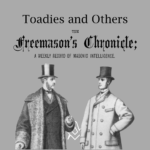 In the realm of Masonry, the principles of equality and respect are paramount. Yet, the presence of toadies—those who obsequiously seek favour from the influential—threatens these ideals. While Masonry embraces diverse beliefs and backgrounds, it rejects the sycophantic behaviours of toadies, flunkeys, and tuft-hunters, urging members to uphold genuine respect and self-worth. The Freemason's Chronicle - 22nd January 1876 |
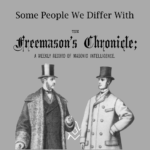 Unveiling the Unpleasant: Some People We Differ With Discover the intriguing dynamics of quarrels within the Masonic brotherhood. From the cantankerous to the litigious, the peevish to the vengeful, delve into the characters that challenge fraternal harmony. Explore their motives, temperaments, and the art of navigating disputes with these fascinating brethren. Brace yourself for a riveting journey into the world of conflicting personalities. |
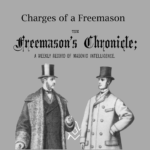 Unravelling the Masonic Mystique: A Deep Dive into the Freemasons' Charges - Explore the intricate world of Freemasonry, its principles, rituals, and the mechanisms for resolving internal disputes. Discover how this ancient fraternity fosters unity, promotes moral conduct, and upholds the sanctity of its secrets, while navigating the complexities of modern society. - The Freemason's Chronicle - 4 December 1875 |
 Unlock the hidden lessons of Masonic Studies! Don't settle for superficial knowledge or mere rituals. Discover the true depth and meaning behind Freemasonry. Expand your understanding of Tracing-Boards, Lectures, and more. Join regular Lodges of Instruction to enhance your Masonic journey. Become a knowledgeable Freemason, not just a token-bearer. Unleash the power of true Masonic wisdom today! |
 Uncover the incredible story of how Masonry saved the life of a Crimean War foot soldier in this historical and masonic account. Through the first hand experience of a soldier engaged in fierce hand-to-hand combat, witness the fateful encounter with a Russian Freemason that changed the course of his life. Learn how brotherhood and a deep dedication to the craft can lead to unforeseen and life-saving circumstances on the battlefield. |
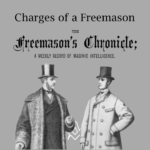 The Freemason's Chronicle - Charges of a Freemason The secrets of Masonry are the exclusive property of the Craft, and can never be communicated to one who is a mere labourer and not an accepted Mason. Hence, no labourer, that is, one who has not been regularly initiated in a legal Lodge. Article first published in The Freemason's Chronicle, 27 November 1875 |
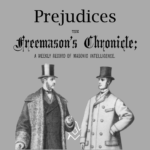 The Freemason's Chronicle - Prejudices Prejudices are partial judgments in favour of, or against certain persons or things, and, for convenience sake, may be ranged in two categories—those which are, comparatively speaking, harmless, and those which are harmful. Article first published in The Freemason's Chronicle, Oct. 2 1875. |
 The Freemason's Chronicle - Cliques Is Freemasonry - a Clique ? Man has been defined as a gregarious animal, but in his highly civilised condition he is gregarious only to a limited extent. First published in The Freemason's Chronicle, Oct. 2 1875, addresses the same challenges then as now. |
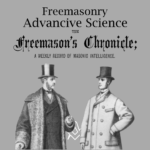 The Freemason's Chronicle - Freemasonry - an Advancive Science Is Freemasonry - an Advancive Science ? Not to confuse advancement with innovation. Has it been the case that Freemasonry's survival for 300 years plus is due to being an Advancive Science, tending to advance. First published in The Freemason's Chronicle 18 September 1875, addresses the same challenges then as now. |
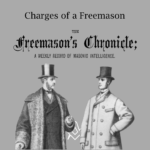 The Freemason's Chronicle - Charges Of A Freemason An interpretation of the "Charges of a Freemason", written Bro. Cornelius Moore and published in 1875, that introduce certain opinions that for some readers, will not sit well in contemporary times. - The Freemason's Chronicle, Sept. 11, 1875 |
 On The Order Of The Temple And Its Doctrine. THE Order of the Temple is divided into two great classes, denominated respectively the Order of the Temple and the Eastern Order. The Eastern Order gave birth to the Order of the Temple, and in the course of time has become an appendage of the latter. It is in ancient Egypt that we find the cradle of the Eastern Order. The Freemason's Chronicle, Sept. 4, 1875 |
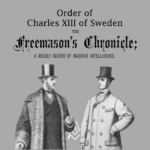 Order of Charles XIII of Sweden The following translation of the Manifesto of King JL Charles XIII of Sweden, on the occasion of his establishing the Masonic Order which bears his name, and of the Statutes of the said Order, may be interesting to our readers. The Freemason's Chronicle, Aug. 28, 1875 |
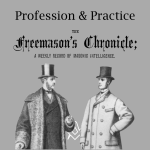 Most of our readers in the course of their experience, have doubtless met with enthusiastic brethren who take it for granted that a Mason can do no wrong. These enthusiasts are thoroughly convinced that the vast majority of those who join the Order are the most benevolent, the most moral, and the very noblest members of society. - The Freemason's Chronicle 10 July 1875 |
 An article investigating the relationship between masonry and citizenship. Are the principles of Freemasonry aligned with the freemason's claim to be a better citizen of the world? The Freemason's Chronicle - 19 June 1875 |
 A visitor must make clear his identity to the satisfaction of the Lodge he proposes to visit. More than once have we been asked to explain our views as to the reception of strangers in a Lodge. - The Freemason's Chronicle - 29 May 1875 |
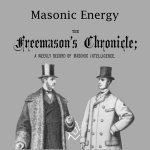 Is there reason in the accusation that Masonic energy looks only to a course of good feeds, when we can point to such grand results as have been achieved in these latter years, both in respect of the extension of our Order ? - 1May 1875 |
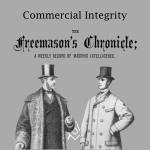 Implementing Freemasonry's peculiar system of morality in our day to day business affairs was the topic of this article, Commercial Integrity, first published in The Freemason's Chronicle - 8 May 1875 |
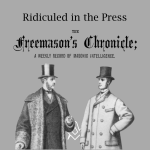 Ridicule has been somewhat illogically described as the test of truth. If it were so, Freemasonry ought to have perished long since. Two press reports from May 1875 covering the |
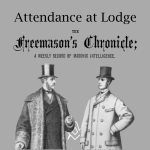 There are many things which Freemasonry will do for a man in the way of opening his mind and giving him larger and kindlier views of life, but Freemasonry itself, cannot eradicate the natural bias of the disposition. |
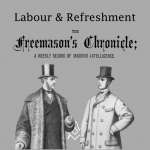 There is, we fear, too marked a tendency in very many Lodges to hasten through its labours, with a view to entering, as soon as possible, upon the business of refreshment. - The Freemason's Chronicle 17th April, 1875 |
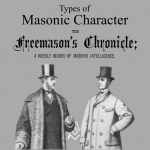 Another example that demonstrates that nothing really changes in Freemasonry. In an article the Types of Masonic Character published 145 years ago in The Freemason's Chronicle 10th April, 1875 |
 A brief history on the relationship between the British Monarchy and the craft - The Freemason's Chronicle 20th March , 1875 |
 What are the qualities of a convivial man and how does this dovetail perfectly in to Freemasonry ? 16th March, 1875 |
 A review of the "Sketch for the History of the Dionysian Artificers," a fragment, by Hyppoli to Joseph Da Costa - This little work may be regarded as, so to speak, the Holy Grail of Masonry. |
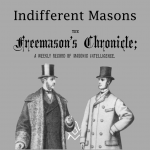 Nothing really changes, an article Indifferent Masons, From Le Monde Maçonnique 1874. Translation published in The Freemason's Chronicle 20th February, 1875 |
 In handling an intruder in the lodge, we endeavoured to show that a good Mason should be a gentleman, and a sincere man. The Freemason's Chronicle 20th February, 1875 |
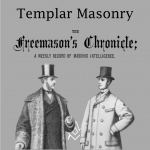 Templar Masonry - a historical aspect of the Religious and Military Order of the Temple published in The Freemason's Chronicle 13th February, 1875 |
 Secrecy perhaps the strongest objection urged by the enemies of the Masonic Order against its existence published in The Freemason's Chronicle 20th March 1875 |
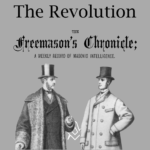 Freemasonry In The United States during And After The Revolution We take a look at Freemasonry in the United States during and after the Revolution first published in The Freemason's Chronicle - February 6, 1875 |
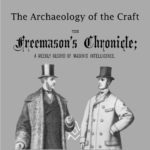 We take a look at the archaeological connection with the Craft, first published in The Freemason's Chronicle - January 30, 1875 |
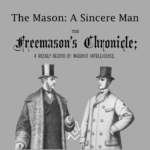 What it means to a Freemason to be a sincere man. Extract: first published in The Freemason's Chronicle - January 23, 1875 |
 What it means to a Freemason to be a citizen of the world ? First published in The Freemason's Chronicle - January 16, 1875 |
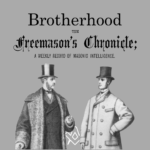 Brotherhood! In that one word what sympathetic associations arise. First published in The Freemason's Chronicle - January 9, 1875 |
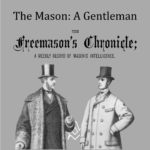 This opening article was written 145 years ago, yet it resonates with Freemasons today as it did then. First published in The Freemason's Chronicle, January 2, 1875, Issue 1 |
masonic knowledge
to be a better citizen of the world
share the square with two brothers

click image to open email app on mobile device








